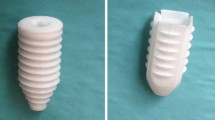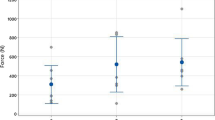Abstract
Tibial fixation remains the weak link of ACL reconstruction over the first 8–12 weeks postoperatively. This study compared the biomechanical properties of tibial fixation for a bone-patellar tendon-bone (BPTB) graft and a novel semitendinosus-bone composite (SBC) allograft with mixed cortical-cancellous bone dowels at each end. Seven paired, fresh frozen cadaveric knees (20–45 years) were stripped of all soft tissue attachments and randomly assigned to receive either the BPTB graft or SBC allograft. Grafts were placed into tibial tunnels via a standard protocol and secured with either a 10 mm×28 mm bioabsorbable (SBC) or titanium (BPTB) screw. Grafts were cycled ten times in a servo hydraulic device from 10–50 N prior to pull to failure testing at a rate of 20 mm/min with the force vector aligned with the tibial tunnel ("worst case scenario"). Wilcoxon Signed Rank Tests were used to evaluate biomechanical differences between graft types (p<0.05). Tibial bone mineral density and interference screw insertion torque were statistically equivalent between graft types. The mode of failure for all constructs was direct screw and graft construct pullout from the tibial tunnel. Significant differences were not observed between graft types for maximum load at failure strength (BPTB=620.8±209 N vs. SBC=601.2±140 N, p=0.74) or stiffness (BPTB=69.8 N/mm±29 N/mm vs SBC=47.1±31.6 N/mm, p=0.24). The SBC allograft yielded significantly more displacement prior to failure than the BPTB graft (15.1±4.9 mm vs 9.2±1.3 mm, p=0.04). Increased construct displacement appeared to be due to fixation failure, with some evidence of graft tissue tearing around the sutures: Bioabsorbable screw (10×28 mm) fixation of the SBC allograft produced unacceptable displacement levels during testing. Further study is recommended using a titanium interference screw or a longer bioabsorbable screw for SBC graft fixation under cyclic loading conditions.



Similar content being viewed by others
References
Barrett GR, Noojin FK, Hartzog CW, Nash CR (2002) Reconstruction of the anterior cruciate ligament in females: A comparison of hamstring versus patellar tendon autograft. Arthroscopy 18:46–54
Blevins FT, Hecker AT, Bigler GT, Boland AL, Hayes WC (1994) The effects of donor age and strain rate on the biomechanical properties of bone-patellar tendon-bone allografts. Am J Sports Med 22:328–333
Bonatus TJ, Alexander AH (1991) Patellar fracture and avulsion of the patellar ligament complicating arthroscopic anterior cruciate ligament reconstruction. Orthop Rev 20:770–774
Brand JC Jr, Pienkowski D, Steenlage E, Hamilton D, Johnson DL, Caborn DN (2000) Interference screw fixation strength of a quadrupled hamstring tendon graft is directly related to bone mineral density and insertion torque. Am J Sports Med 28:705–710
Charlick DA. Caborn DN (2000) Technical note: alternative soft-tissue graft preparation technique for cruciate ligament reconstruction. Arthroscopy 16:E20
DuMontier TA, Metcalf MH, Simonian PT, Larson RV (2001) Patella fracture after anterior cruciate ligament reconstruction with the patellar tendon: A comparison between different shaped bone block excisions. Am J Knee Surg 14:9–15
Hamner DL, Brown CH Jr., Steiner ME, Hecker AT, Hayes WC (1999) Hamstring tendon grafts for reconstruction of the anterior cruciate ligament: Biomechanical evaluation of the use of multiple strands and tensioning techniques. J Bone Joint Surg 81A:549–557
Haut Donahue TL, Howell SM, Hull ML, Gregersen C (2002) A biomechanical evaluation of anterior and posterior tibialis tendons as suitable single-loop anterior cruciate ligament grafts. Arthroscopy 18:589–597
Howell SM, Wallace MP, Hull ML, Deutsch ML (1999) Evaluation of the single-incision arthroscopic technique for anterior cruciate ligament replacement. A study of tibial tunnel placement, intraoperative graft tension, and stability. Am J Sports Med. 27:284–293
Kartus J, Movin T, Karlsson J (2001) Donor-site morbidity and anterior knee problems after anterior cruciate ligament reconstruction using autografts. Arthroscopy 17:971–980
Liu HS, Kabo MJ, Osti L (1995) Biomechanics of two types of bone tendon-bone graft for ACL reconstruction. J Bone Joint Surg 77B:232–235
Miller MD, Nichols T, Butler CA (1999) Patella fracture and proximal tendon rupture following arthroscopic anterior cruciate ligament reconstruction. Arthroscopy 15:640–643
Moebius UG, Georgoulis AD, Papageorgiou CD, Papadonikolakis A, Rossis J, Soucacos PN (2001) Alterations of the extensor apparatus after anterior cruciate ligament reconstruction using the medial third of the patellar tendon. Arthroscopy 17:953–959
Morgan CD, Kalman VR, Grawl DM (1995) Isometry testing for anterior cruciate ligament reconstruction. Arthroscopy 11:647–659
Morrison JB (1969) Function of the knee joint in various activities. Biomed Eng 4:573–580
Morrison JB (1970) The mechanics of the knee joint in relation to normal walking. J Biomech 3:51–61
Nakamura N, Horibe S, Sasaki S et al (2002) Evaluation of active knee flexion and hamstring strength after anterior cruciate ligament reconstruction using hamstring tendons. Arthroscopy 18:598–602
Noyes FR, Butler DL, Grood ES, Zernicke RF, Hefzy MS (1984) Biomechanical analysis of human ligament grafts used in knee-ligament repairs and reconstructions. J Bone Joint Surg 66A:344–352
Noyes FR, Butler DL, Paulos LE, Grood ES (1983) Intra-articular cruciate reconstruction. I: perspectives on graft strength, vascularization, and immediate motion after replacement. Clin Orthop 172:71–77
Nyland J (1999) Rehabilitation complications following knee surgery. Clin Sports Med 18:905–925
Odensten M, Gillquist J (1985) Functional anatomy of the anterior cruciate ligament and a rationale for reconstruction. J Bone Joint Surg 67A:257–262
Petsche TS, Hutchinson MR (1999) Loss of extension after reconstruction of the anterior cruciate ligament. J Am Acad Orthop Surg 7:119–127
Pinczewski LA, Clingeleffer AJ, Otto DD, Bonar SF, Corry IS (1997) Integration of hamstring tendon graft with bone in reconstruction of the anterior cruciate ligament. Arthroscopy 13:641–643
Rodeo SA, Arnoczky SP, Torzilli PA, Hidaka C, Warren RF (1993) Tendon-healing in a bone tunnel: a biomechanical and histological study in the dog. J Bone Joint Surg 75A:1795–1803
Scheffler SU, Norbert CM, Sudkamp NP, Gockenjan A, Hoffmann RFG, Weiler A (2002) Biomechanical comparison of hamstring and patellar tendon graft anterior cruciate ligament reconstruction techniques: the impact of fixation level and fixation method under cyclic loading. Arthroscopy 18:304–315
Selby JB, Johnson DL, Hester P, Caborn DN (2001) Effect of screw length on bioabsorbable interference screw in a tibial bone tunnel. Am J Sports Med 29:614–619
Shino K, Inoue M, Horibe S, Hamada M, Ono K (1990) Reconstruction of the anterior cruciate ligament using allogeneic tendon: long term followup. Am J Sports Med 18:457–465
Shino K, Nakagawa S, Inoue M, Horibe S, Yoneda M (1993) Deterioration of patello-femoral articular surfaces after anterior cruciate ligament reconstruction. Am J Sports Med 21:206–211
Takeuchi R, Saito T, Mituhashi S, Suzuki E, Yamada I, Koshino T (2002) Double-bundle anatomic anterior cruciate ligament reconstruction using bone-hamstring bone composite graft. Arthroscopy 18:550–555
Yasuda K, Tsujino J, Ohkoshi Y, Tanabe Y, Kaneda K (1995) Graft site morbidity with autogenous semitendinosus and gracilis tendons. Am J Sports Med 23:706–714
Author information
Authors and Affiliations
Corresponding author
Additional information
Arthrex Inc., Naples, FL, USA sponsored this study
Rights and permissions
About this article
Cite this article
Kocabey, Y., Klein, S., Nyland, J. et al. Tibial fixation comparison of semitendinosus-bone composite allografts fixed with bioabsorbable screws and bone-patella tendon-bone grafts fixed with titanium screws. Knee Surg Sports Traumatol Arthrosc 12, 88–93 (2004). https://doi.org/10.1007/s00167-003-0370-y
Received:
Accepted:
Published:
Issue Date:
DOI: https://doi.org/10.1007/s00167-003-0370-y




